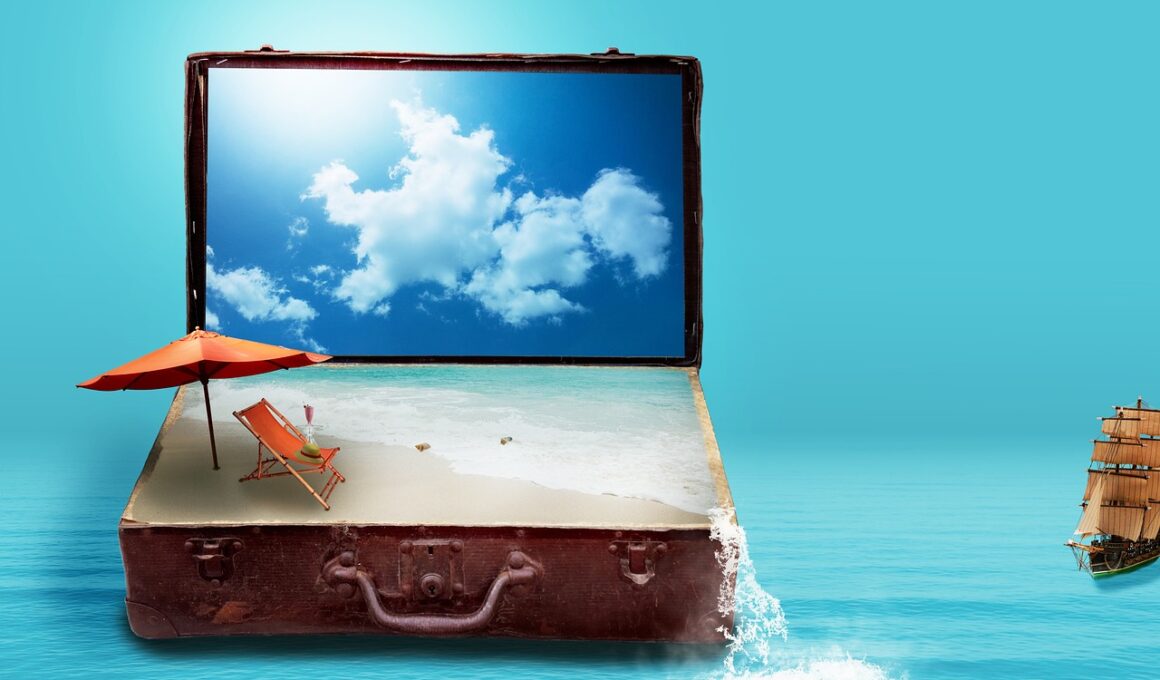How to Allocate Your Travel Budget Between Accommodation, Food, and Activities
Planning the ideal travel budget can become quite overwhelming. In order to make the most of your trip, prioritizing your spending is crucial. A well-allocated budget not only enhances your experience but also helps you stay within your financial limits. First, identify your total budget for the trip. This figure will serve as your baseline and guide your spending decisions across various categories. It’s vital to track where every penny goes to maintain control over your finances. Prioritize areas that matter the most – whether it’s luxurious accommodation, exquisite meals, or engaging activities. Inevitably, different destinations will have unique costs associated with each category. To simplify this, use budgeting apps or simple spreadsheets to monitor expenses in each area. Consider setting percentage goals for each category. This way, you can ensure that you do not overspend in one area. Flexibility is key, allowing you to adjust as needed. Remember, budgeting is not about restriction but making informed choices that lead to a satisfying travel experience.
Understanding Accommodation Costs
Accommodation often represents a significant portion of your travel budget, and it’s essential to allocate funds wisely. Research various types of accommodations, from hotels to hostels, and even vacation rentals. Each option carries different price points, so compare amenities, locations, and user reviews. Determine what aspects are vital for your stay. For instance, do you prioritize luxury over proximity to attractions? Balancing comfort, convenience, and cost can yield fantastic savings. Looking for deals through travel websites or booking platforms can also help find discounts. Generally, aim to allocate around 30-50% of your total travel budget to accommodation. However, adjust this percentage based on personal preferences and destination prices. For example, if traveling to a more expensive city, you may need to increase this portion to maintain a comfortable experience. Consider off-season travel which can lower accommodation costs significantly. Your choice of stay influences the overall experience, so choose wisely for maximum enjoyment. Tracking all accommodation expenses accurately will help in sticking to your allocated budget.
Food expenses can dramatically impact your travel budget, depending on your dining preferences. Allocating a reasonable portion of your budget to food ensures you enjoy local cuisine and memorable dining experiences. A common approach is to reserve about 20-30% of your overall budget for meals. However, this can vary significantly based on location. For instance, street food in some countries can be both delicious and affordable, while fine dining establishments can deplete your budget quickly. Exploring local markets for fresh produce and snacks is a fantastic way to save money while experiencing authentic cuisine. Consider preparing some meals if your accommodation allows, as this can cut down costs tremendously. Local eateries often provide a more genuine taste of the culture and excellent value for your money compared to tourist traps. Furthermore, researching restaurants beforehand can help identify places that fit within your budget. Track your daily food expenses to avoid overindulgence. This disciplined approach allows you to enjoy your culinary adventures while staying within budget constraints to keep your travels enjoyable.
Budgeting for Activities
Engaging activities are an essential aspect of any travel experience, and budgeting for these experiences requires thoughtful planning. Allocate about 20-40% of your total budget for activities, depending on the nature of the trip. Popular attractions, tours, and events often come with entry fees, so research costs in advance. Prioritize the activities that you’re most excited about and look for bundle deals or discounts online. Consider free or low-cost attractions in your destination that offer rich experiences without breaking the bank. Museums, parks, and local events can provide immersive cultural insights without hefty fees. Often, walking tours led by locals can be both budget-friendly and enriching. Keep an eye out for special promotions or city passes. These can grant entry to multiple attractions at a reduced overall cost. Flexibility in your budget allows for spontaneity, letting you seize unexpected opportunities. Keeping a daily log of activities and their costs will help in adhering to your budget. Make sure you balance paid experiences with free explorations for a fulfilling trip.
Lastly, remember to account for miscellaneous expenses, including transportation, souvenirs, and any unexpected costs. Setting aside a small percentage of your budget can be beneficial to accommodate these additional expenditures. Allocate 10-15% of your overall budget for these types of expenses. Sometimes, local transport can add up quickly without realization, particularly in cities with limited public transportation. Consider options like walking or biking to explore at a leisurely pace and save money. For souvenirs, decide beforehand what’s meaningful to you and set a cap for spending. This will prevent impulse buys that can derail your budget. Unexpected situations, such as extra fees or emergencies, may arise, so having a safety net reduces stress. It’s all about making informed choices while still enjoying the spontaneity of travel. Keeping a flexible attitude toward your budget is essential. Many travelers find that the most valuable experiences are the ones that are unplanned. Preparing for the unexpected can lead to great adventures. Just remember, a well-planned budget sets the foundation for a memorable journey.
Reviewing and Adjusting Your Travel Budget
After planning out your initial budget, regular reviewing and adjusting will help keep you on track. As you travel, costs in various categories may fluctuate, requiring timely adjustments for balance. Keep daily records of expenses and assess your spending habits. If you notice that you are consistently overspending in food or activities, it may be worthwhile to cut back in those areas. On the other hand, evaluate any areas where you may have over-allocated funds. For instance, if accommodations were cheaper than expected, consider reassigning those savings into activities or dining to exploit those offerings more. Additionally, be open to changing your plans based on actual costs, making you a more adaptable traveler. Utilize apps to track and categorize expenses in real-time, ensuring that you remain updated. Periodically reviewing your budget can also enhance your overall travel experience by helping you allocate resources more effectively. It allows you to prioritize what adds the most joy to your trip—be it cuisine, entertainment, or unique adventures. Making smart adjustments ensures financial peace of mind and memorable experiences.
Finally, the key to successful travel budgeting is finding the right balance between accommodation, food, and activities. Think about what’s most important for your enjoyment and satisfaction during your trip. Communication is also essential, especially if traveling with a group. Ensure everyone is aligned on budget priorities. Setting clear expectations can prevent overspending and potential conflicts throughout the trip. Ultimately, budgeting serves as a framework rather than a strict guideline. Allow yourself the freedom to explore and enjoy while keeping an eye on your spending. Stick to your budget without constricting your experience. If needed, consider adopting a cashback credit card for travel expenses, maximizing benefits while remaining within budgeting parameters. Financial literacy grows with experience, and travel offers many valuable lessons. Every trip is a stepping stone towards becoming a more proficient budget traveler. Developing these skills not only enhances future travels but also enriches your life. Emphasizing mindful spending promotes greater overall satisfaction and enjoyment during your journey, allowing for unforgettable memories and experiences that enrich your life.


